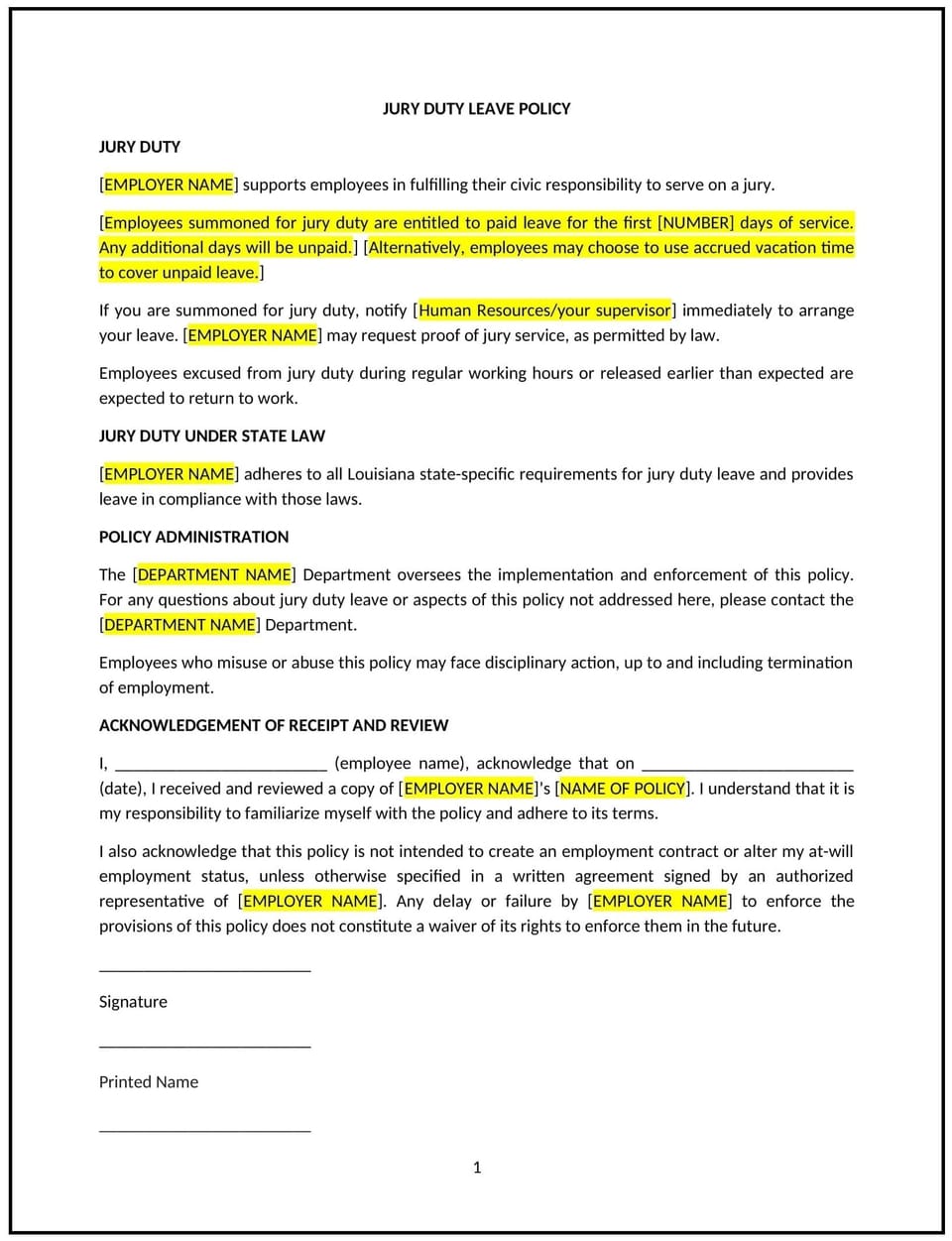Jury duty leave policy (Louisiana): Free template

Jury duty leave policy (Louisiana)
This jury duty leave policy is designed to help Louisiana businesses provide clear guidelines for employees summoned for jury service. It outlines procedures for requesting leave, documentation requirements, and how time off will be managed to support employees fulfilling their civic duties.
By implementing this policy, businesses can support employee obligations while maintaining operational efficiency.
How to use this jury duty leave policy (Louisiana)
- Define eligibility: Specify which employees are eligible for jury duty leave, such as full-time, part-time, or temporary employees.
- Outline leave request procedures: Provide steps for notifying the employer of jury duty, including the required advance notice and submission of summons documentation.
- Address pay and benefits: Clarify whether jury duty leave is paid or unpaid and how benefits will be managed during the leave period.
- Include return-to-work expectations: Detail how employees should communicate their return to work after completing jury service.
- Provide guidelines for extended service: Explain how to handle situations where jury duty extends beyond a short-term absence.
- Communicate documentation requirements: Specify any paperwork employees need to provide, such as proof of jury duty completion.
Benefits of using a jury duty leave policy (Louisiana)
Implementing this policy provides several advantages for Louisiana businesses:
- Supports civic responsibility: Encourages employees to participate in an essential public duty.
- Promotes fairness: Provides clear and consistent guidelines for managing jury duty leave requests.
- Minimizes disruptions: Establishes structured procedures for planning around employee absences.
- Protects employee morale: Demonstrates respect for employees’ legal obligations and personal commitments.
- Reflects Louisiana-specific practices: Tailors leave management to local court procedures and requirements.
Tips for using this jury duty leave policy (Louisiana)
- Communicate clearly: Ensure employees understand the policy and their responsibilities for notifying the employer about jury duty.
- Maintain flexibility: Be prepared to adjust schedules or redistribute workloads to accommodate absences.
- Track documentation: Keep records of jury duty notices and completion certificates for future reference.
- Train managers: Equip supervisors to handle jury duty leave requests respectfully and consistently.
- Review periodically: Update the policy to reflect changes in workplace practices or Louisiana-specific legal requirements.
Q: Who is eligible for jury duty leave under this policy?
A: Jury duty leave is typically available to all employees, including full-time, part-time, and temporary staff, as specified in the policy.
Q: Is jury duty leave paid or unpaid?
A: Whether jury duty leave is paid depends on the company’s policy, which should be outlined clearly for employees.
Q: What documentation is required to request jury duty leave?
A: Employees must provide a copy of the jury summons and, if requested, proof of service upon completion of jury duty.
Q: How should employees notify their employer about jury duty?
A: Employees should notify their manager or HR as soon as they receive a jury summons, following the procedures outlined in the policy.
Q: What happens if jury duty extends beyond a few days?
A: The policy should address extended jury service, such as how pay and benefits will be managed during longer absences.
Q: How often should this policy be reviewed?
A: The policy should be reviewed annually or when there are updates to Louisiana jury duty regulations or workplace practices.
Q: What steps should businesses take to plan for employee absences due to jury duty?
A: Businesses can cross-train staff, redistribute workloads, or adjust project timelines to ensure continuity during employee absences.
This article contains general legal information and does not contain legal advice. Cobrief is not a law firm or a substitute for an attorney or law firm. The law is complex and changes often. For legal advice, please ask a lawyer.


